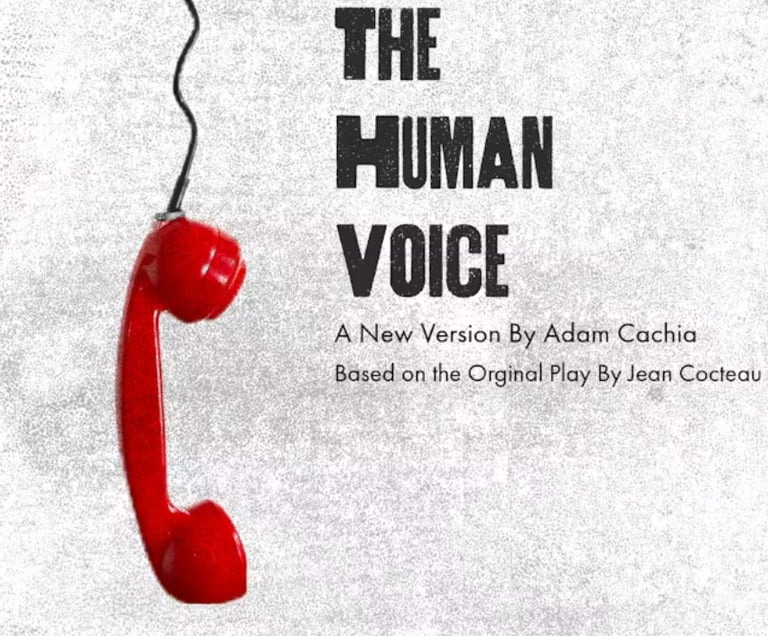
The Human Voice
A bold, intimate production that adds an exciting layer to Cocteau’s timeless work.


Peripeteia Theatre’s latest production at The Kings Arms is one to catch, but hurry - there are only two performances left. The company presents The Human Voice, a powerful adaptation by Artistic Director Adam Cachia of Jean Cocteau’s 1930 classic. Set in the present day, Cachia’s version retains the emotional intensity of Cocteau’s original text while exploring the pieces key themes of loneliness, desperation, and suicide through a contemporary lens; as singular character "the woman" has her final phone call with the love of her life.
By updating the setting, Cachia has effectively been able to amplify Cocteau's exploration of loneliness within the context of a hyper-connected world. In an age where virtual interactions often replace real-world connection, the central line,“I’m whispering into your ear, and we couldn’t be further apart” from the original text, becomes all the more poignant. The production doesn’t shy away from the raw honesty of these themes, confronting them with unflinching vulnerability.
The decision to cast different performers for each night of the limited run is a fascinating and ambitious creative choice. It allows the actors to explore the material in a variety of ways, offering audiences a unique experience each time. Given the universal themes of the play, romantic heartbreak and the emotional devastation of an ending relationship, this casting choice brings new layers to the story. The role of "the woman" is intentionally undefined, making the performance adaptable to a range of ages, backgrounds, and interpretations. If time had allowed, it would have been fascinating to witness the varying nuances each performer would bring to the role, deepening appreciation of the production and its exploration of human vulnerability.
Executing a one-person play is no small feat, but Jess Gough’s performance proved extraordinary. For an hour, the audience only hears one side of a phone conversation, a challenge that could easily falter without careful attention. Yet Gough’s portrayal was captivating, drawing the audience into "the woman’s" psychological and emotional journey with precision and depth. Gough’s interpretation brought a sharp, self-deprecating wit to the character, balancing moments of humour with deep sorrow. Her delivery turns some of the play's darker lines, such as the woman’s suicidal thoughts, into raw, biting expressions of pain, giving us a glimpse of the fiercer side of the character. The intimate setting of The Kings Arms works to the performers advantage, amplifying the emotional impact of even the smallest gestures. Through subtle use of her eyes and hands, Gough conveyed the hidden layers of the character’s emotional turmoil. There are moments when her physicality alone communicated more than words could express, allowing us to understand "the woman's" inner struggle with startling clarity. There was, however, one small distraction: Gough occasionally appeared to be relying on paper prompts. While understandable, given the shorter notice of this performers casting, this slightly breaks the immersion. A smoother integration of the prompts into the set, perhaps as something the character interacts with, like a magazine or an object she anxiously flips through, could have made it feel less intrusive and more in line with the character’s state of mind. This minor issue aside, Gough’s performance was a strong testament to her skill and the deep emotional engagement she brings to the character.
Cachia’s adaptation demonstrates a deep respect and admiration for Cocteau’s original work, especially in the way it highlights the text’s poetic beauty. The underscored orchestration by Áron Gyenge effectively complements and reinforces the key moments of the character’s emotional spiral, enhancing the impact without spoon-feeding the audience. These moments, marked by Cocteau’s lyrical language, are the highlights of the production, offering a poignant reflection on human suffering. However, the choice to set the play entirely in the present day, particularly with the character using a vintage corded phone, felt somewhat discordant with the rest of the production. Given the prevalence of mobile phones today, it seemed unlikely that the character would still be using such an outdated device, especially in a world where young adults often don’t even own landlines. While the retro phone adds a visual aesthetic, a more contemporary device, or even a slightly earlier setting when landlines were still common, might have made the production feel more cohesive and grounded in reality. The character’s use of a vape throughout also highlights the tension between the outdated phone and modern habits, which could have been better aligned.
Despite these minor quibbles, Peripeteia Theatre’s production is a powerful emotional experience. If you have the chance, try to catch one of the final performances, better yet, see both, as the varying interpretations of the role promise to offer new insights and emotional depth. Best of luck to Tsen Day-Beaver and Maddy Myles, who complete the cast, and congratulations to Jess Gough for her outstanding performance. Kudos to Peripeteia Theatre for taking risks with such a bold, intimate production that adds an exciting layer to Cocteau’s timeless work.
© Peripeteia Theatre
